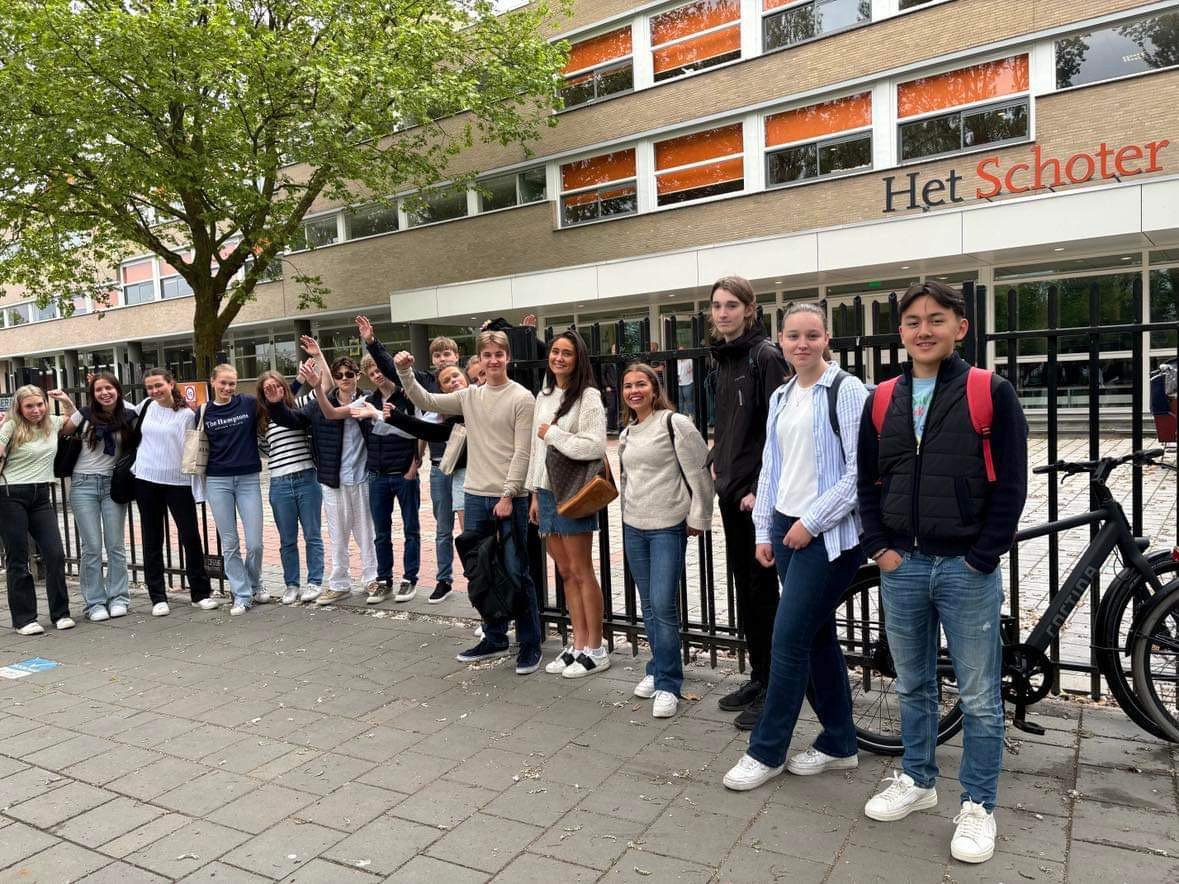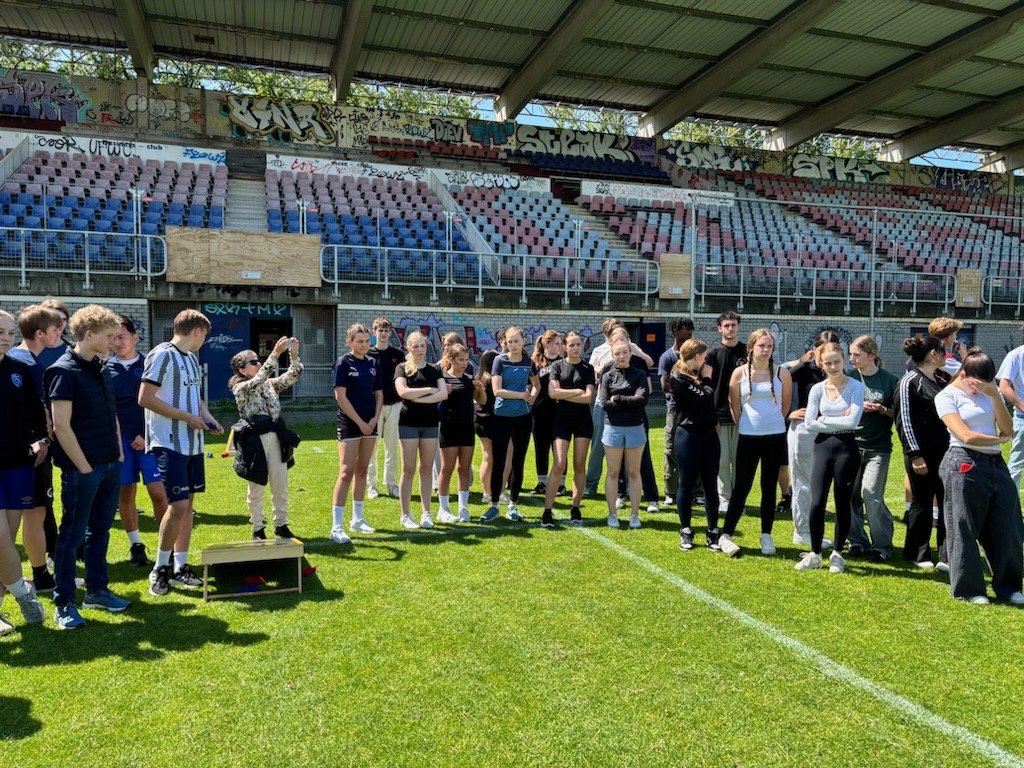Student mobility Haarlem, Netherlands Host school: Het Schoter 20/5-24/5
Student mobility Haarlem, The Netherlands
Host school: Het Schoter
Sub-theme: Colonization and decolonization
Five activity days (20/5-24/5)
Participating schools:
1. Metis High School Bergen
2. Greve Gymnasium, Copenhagen
3. Escola Secundária de Cacilhas-Tejo, Almada, Lisbon
4. Het Schoter, Haarlem (host school)
Participants from Metis Upper Secondary School Bergen:
1st grade (16 students) and two teachers: Anbjørg Igland and Sara Berge Økland
Preparation:
Before the trip to Haarlem, the students watched the film "The East", a modern feature film depicting the Dutch colonization of Indonesia. Our students were surprised by the violent nature of the events depicted in the film. The students thus gained insight into a part of recent European history that was largely unknown to them.
In addition to the film, the preparatory work involved reading two expert articles selected by the Dutch Erasmus team.
The students worked on assignments during and after the film. The assignments provided space for reflection and critical thinking about the film and the historical events that took place in the film.
Day 1 Introduction and history
Welcome to Het Schoter and icebreaker led by Marija Kamminga, before a lecture by history teacher Frans Rumpt about Dutch colonization and the "Golden Age". The development of views from pride to demands for compensation. In 1945, the decolonization/colonial war with Indonesia began, and in 1949 Indonesia gained its independence.
Then an introduction to transnational group tasks “colonization and decolonization” that were to be carried out every day (transnational groups of 6 students), where the students had different roles.
Finally, as part of the transnational group activities, a city walk in Haarlem and visit to the Frans Hals Museum, the exhibition “Women in the schuttereszaal” (militia made up of citizens to protect their city).
Day 2 History and social studies
City walk in Amsterdam to places related to our colonial past and visit to the Wereldmuseum, the exhibition “Our Colonial Heritage”. The transnational group tasks related to the city walk and the museum exhibition were to discuss topics related to colonization and decolonization. The student groups were guided by a host at the museum. The exhibition at the museum was characterized by a modern view of history. The demonstration was both suitable for giving students insight into historical events, while encouraging them to come to terms with ethical choices in Western history that are not representative of moral and ethical choices made by Western countries in the present.
The day in Amsterdam gave our students a good opportunity to get to know the participants from Denmark, the Netherlands and Portugal better. This gave the students cultural experience. Furthermore, the students got to experience maneuvering in a modern big city. For many of our 16-17 year old students, this was the first time they had done something like this without adults.
Activity Day 3: Politics
At the host school Het Schoter, the students had the opportunity to meet and debate with municipal officials from Haarlem and Hoorn about the colonial past and its impact on today's Dutch society. This was primarily a student-led debate about colonization and decolonization. The students were thus encouraged to express their opinions and reflections, listen to other points of view, and take a stand on political issues. Among the political issues were the protection or removal of monuments and financial compensation to former colonies.
The transnational group activity that day was to make a film related to the museum visit in Amsterdam and tomorrow's political debate.
Activity Day 4: Working hours and sports
On this day, at the host school Het Schoter, the students mainly worked on completing their final assignments, which were to be presented the next afternoon.
At the end of the day it was time for sports. The students, in their transnational groups, participated in various station-based activities. Some of the stations were activities that our Norwegian students are already familiar with, while other activities were traditional Dutch ones.
Activity day 5: Working hours and presentations
On the last day at Het Schoter, the students worked on their final assignments and in the afternoon each transnational group presented their work. Many great works based on colonization and decolonization and what the students had experienced during the project week were presented.
Finally that day, our host school organized a traditional Indonesian dinner “rijsttafel” for us at school.
Summary!
Student feedback:
This trip has been fun and amazing. It was fun working with students from Denmark, Portugal and the Netherlands. The tasks given during the sightseeing were interesting and educational. Our free time was really fun, both the trip to Amsterdam and the bike ride to the beach in Haarlem.
This trip has been so interesting and full of new exciting experiences. We enjoyed the tasks, and all the other students were very nice and caring. It was so fun to see that we come from such different cultures, and that our school systems are so different.
We learned a lot when we got to explore Amsterdam and visit the Wereldmuseum.
Teachers' feedback:
The themes for this gathering were particularly relevant to promoting democratic citizenship, including reflection on the choices of our ancestors and how we should relate to colonization and decolonization in the present. The theme is thus relevant to contemporary societal debates, but also transferable to other situations marked by disagreement.
Colonization and decolonization are topics that in Norwegian schools are mainly covered by the subject of history. Our students have not yet had history in upper secondary school, but will receive regular teaching in the subject for the next two school years. This meant that our students had limited knowledge of the subject, despite the preparatory work before the trip to Haarlem. However, the stay has given the students a unique insight into a subject that they will delve further into over the next two years during their regular schooling at Metis.
Norway has been involved in colonization to a lesser extent in modern history than Denmark, Portugal and the Netherlands. Nevertheless, it is our common responsibility to come to terms with an undemocratic history, something our students have reflected on less than the other students before the trip.
The academic and pedagogical content of the teaching, designed by the Dutch, was of high quality.
“ This trip has been so interesting and full of new exciting experiences. We enjoyed the tasks, and all the other students were very nice and caring. It was so fun to see that we come from such different cultures, and that our school systems are so different. ”






